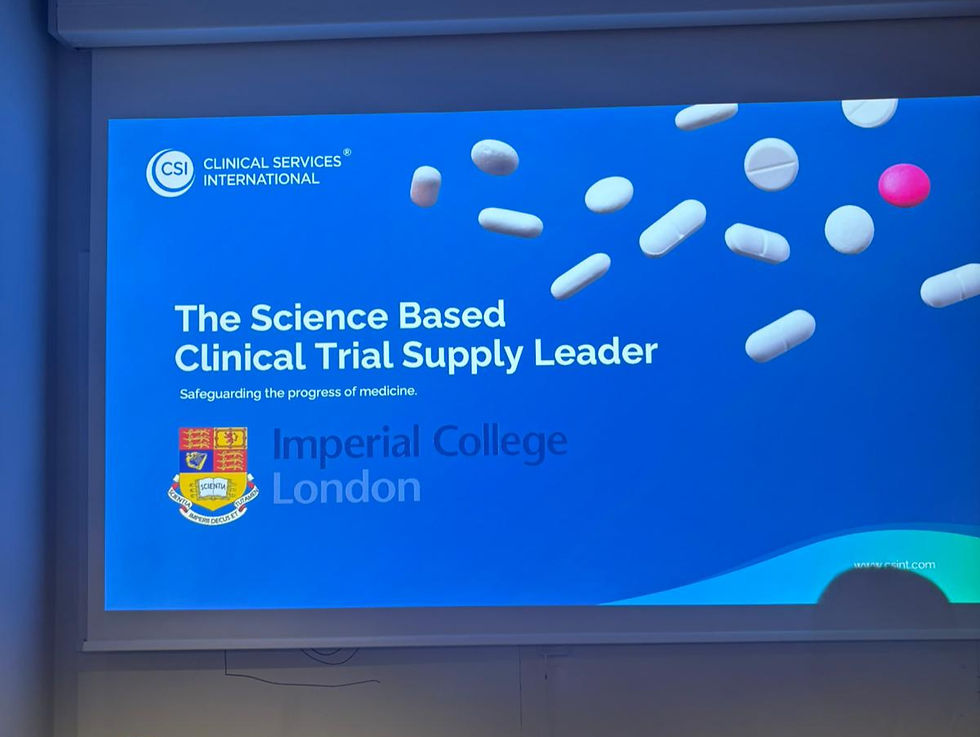Clinical Supply Logistics: A Key Pain Point for Biotech and Pharmaceutical companies
- Clinical Services International (CSI)

- Mar 1, 2024
- 2 min read
Updated: Apr 30, 2024

The management of clinical supply logistics has emerged as a particular challenge for Contract Research Organizations (CROs) serving biotech and pharmaceutical clients. As clinical studies are becoming more complex and expensive, biotech’s are turning to CROs for full-service outsourcing, to unburden themselves of the complexities and costs of clinical trials. Amidst this collaboration, concerns persist regarding the satisfaction levels and the efficacy of supply delivery logistics.
The logistical needs of biotech and pharmaceutical are multifaceted, encompassing the intricate coordination of timely and safe delivery of supplies, managing complex distribution networks, returns and destructions and complying with stringent regulatory requirements. These tasks become even more daunting for small biopharma companies, which often operate with limited resources and infrastructure. Biotech firms therefore rely heavily on CROs for such services however have expressed lower satisfaction levels with CROs compared to their established pharma counterparts.
A survey conducted among 80 CRO customers, spanning both large pharma and biotech firms, sheds light on the disparity in satisfaction levels and in particular, dissatisfaction with logistical services. Across all 14 service areas assessed—ranging from study design and project management to lab services and supply logistics—respondents from both pharma and biotechs rated logistical services low and as a particular source of bottlenecks [1].

Key concerns voiced by CRO clients from qualitative interviews include the perceived lack of focus on C-suite needs, misalignment of incentives due to the fee-for-service model, and a limited differentiation among CROs in terms of services. These challenges underscore the need for CROs to reassess their approach and provide full-service, tailored solutions that address the unique requirements of biotech clients.
Clinical Services International (CSI) brings strategic perspective to the table, providing efficient sourcing, distribution and waste management practices, resulting in substantial cost savings; a factor of paramount importance for resource-constrained biotech firms. For open label studies, CSI can deliver directly to sites in a fast, reliable and cost-effective manner.
Moreover, CSI plays a crucial role in de-risking studies by implementing robust project management practices. By supporting CROs in establishing themselves as best-of-breed full-service "general contractors," CSI facilitates the seamless management of Investigational Medicinal Products (IMPs), comparator sourcing, packaging, labelling, combination therapy and ancillary services.
As established pharmaceutical companies are resorting to bring these services in-house again following outsourcing frustrations, the value proposition of CROs to smaller biotech companies becomes ever more apparent. With the biotech market projected to grow significantly and exponentially, there exists a ripe opportunity for CROs to align their services with the unmet needs of this sector.
In conclusion, clinical supply logistics stands as a critical pain point for CROs serving biotech clients. However, with the strategic integration of innovative solution providers such as CSI, CROs can not only mitigate these challenges but also emerge as indispensable partners in driving the success of clinical trials within the biopharmaceutical ecosystem.
[1] Bleys J, Fleming E, Mirman H, The L, CROs and biotech companies: Fine-tuning the partnership. McKinsey & Company, Life Sciences Practice, June 2022. Source: McKinsey Customer Survey, May 2021




.png)
Comments